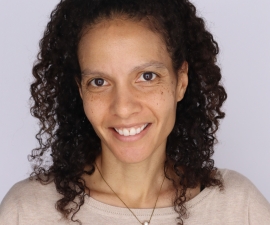

Research Bio
Sarah E. Vaughn is an Associate Professor of Anthropology working at the intersection of environmental anthropology, critical social theory, and science and technology studies. She received her B.A. in 2006 from Cornell University, majoring as a College Scholar with a focus in Anthropology, Sociology, and Inequality Studies. She was awarded a Ph.D. in 2013 from the Department of Anthropology, Columbia University. She is affiliated with the Center for Science, Technology and Medicine, The Program in Critical Theory, and the Program in Development Engineering.
Vaughn’s research agenda entails developing an ethnographic approach and critical social theory of climate adaptation. This research has primarily focused on Guyana and Bermuda. She is particularly interested in the way climate adaptation addresses the politics of potentiality in cultures of engineering, wetlands and coastal-scapes, and historical narratives of settlement. Her research is based around two questions: 1) How do people imagine and confront their vulnerability to climate change? 2) How does technology mediate people’s experiences of climate change and valuation of environments? She takes a posthumanist and new materialist perspective on climate adaptation to address these questions. More broadly, she is interested in the ways technology has become an important, and at times taken for granted, object of intervention in climate adaptation projects.
Vaughn’s early research addressed these concerns by examining the social networks of accountability that inform climate adaptation projects. Her first book Engineering Vulnerability: In Pursuit of Climate Adaptation(link is external)(link is external). (2022), examines climate adaptation against the backdrop of ongoing processes of settler colonialism and the global climate change initiatives that seek to intervene in the lives of the world’s most vulnerable. Engineering Vulnerability has been awarded the Inaugural Duke University Press Scholars of Color First Book Award (2021) and the American Anthropological Association’s 2022 Julian Steward Award.
Vaughn’s interests in technological innovation and climate adaptation have informed her second book project, After 1.5˚C: Essays on Technological Worldmaking and Climate Change (in preparation) which asks what technology offers and does for mapping the current conditions of crisis brought on by climate change. And her other ongoing research project, Cultivating an Environmental Spirit: Finance, Climate Change, and Ethics in Bermuda explores how the reinsurance industry has become a critical site of expertise for the data-driven accounting of climate change. This research is supported by a National Endowment for the Humanities Archeological and Ethnographic Fieldwork Grant (2022-2024).
Vaughn’s research and writing have been supported by the Social Science Research Council, the American Council of Learned Societies, the Institute for Advanced Study (Princeton), the National Endowment for the Humanities, among others. During the 2024-2025 academic year she is the Katherine Hampson Bessell Fellow at the Harvard Radcliffe Institute.
Recent descriptions of her work can be found at the resources listed below
“Engineering Vulnerability: In Pursuit of Climate Adaptation in conversation with Archit Guha.” New Books Network, https://newbooksnetwork.com/engineering-vulnerability
“Under the Rubric: Engineering Ecologies, with Alice Rudge and Sarah E. Vaughn.” Comparative Studies in Society and History Online, https://sites.lsa.umich.edu/cssh/2022/12/14/engineering-ecology-with-alice-rudge-and-sarah-vaughn/
“10 Questions for Sarah E. Vaughn.” Massachusetts Review. Access, https://www.massreview.org/blog/10%20Questions
"Spotlight/Ideas." Institute for Advanced Study, https://www.ias.edu/ideas/scholar-spotlight-sarah-e-vaughn
“Intersectional Ecologies.” Cultures of Energy Podcast (Episode 205), https://cenhs.libsyn.com/205-intersectional-ecologies
See faculty web page for selected publications and Google Scholar for a comprehensive list of publications.
Research Expertise and Interest
anthropology, Science and Technology studies, environment, Expertise, climate change, historicism, theories of liberalism, Caribbean/Latin America

